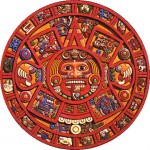
Early contact? Mayan calendar similar to ancient Chinese
Tara MacIsaac
Epoch Times
Thu, 07 Sep 2017 16:17 UTC
![th[7]](http://thehollowearthinsider.com/blog/wp-content/uploads/2017/03/th7.jpg) Ancient Mayan and Chinese calendar systems share so many similarities, it is unlikely they developed independently, according to the late David H. Kelley, whose paper on the subject was published posthumously in August.
Ancient Mayan and Chinese calendar systems share so many similarities, it is unlikely they developed independently, according to the late David H. Kelley, whose paper on the subject was published posthumously in August.
Kelley was a Harvard-educated archaeologist and epigrapher at the University of Calgary in Canada. He earned fame in the 1960s for major contributions toward deciphering the Mayan script. His article, titled “Asian Components in the Invention of the Mayan Calendar,” was written 30 years ago, but was only recently unearthed and published for the first time in the journal Pre-Columbiana.
In 1980, a major science journal had solicited the article, said Pre-Columbiana’s editor Dr. Stephen Jett. But, Jett said, “the editors rejected it as being overly documented for the journal’s spare format; understandably for so revolutionary an effort, Dave did not wish to weaken the documentation, and he never published the piece elsewhere.” Jett obtained Kelley’s permission to publish it before he died. Read Complete Report
This video is part of The Alignment Within and explains how The Mayan Calendar Works.
If you’ve ever wondered how The Mayan Calendar Works, this is the film to watch
Source: YouTube mayancalendarnow Published on Nov 7, 2012
The Chinese Zodiac is a 12 year cycle symbolized by the 12 animals. Each animal has a different personality and characteristics that influence a person’s personality, success, and happiness.
Source: YouTube videosvibes Uploaded on Aug 3, 2009
Dig a little Deeper: Mayan , Ancient Chinese








